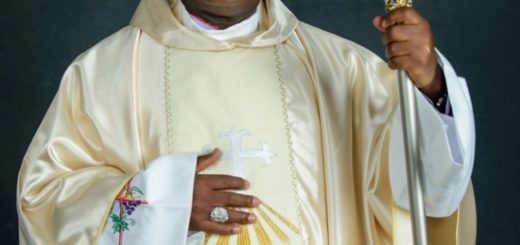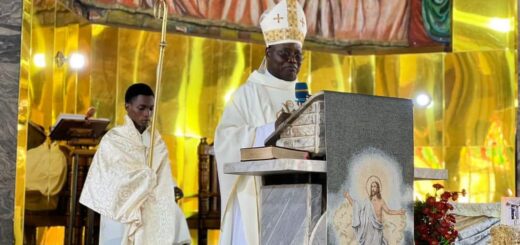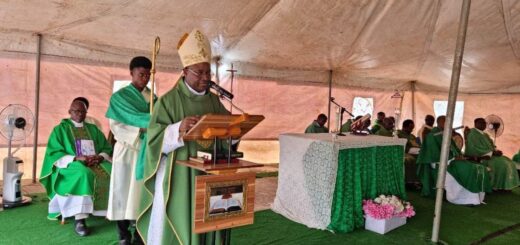PASTORAL MESSAGE PRESENTED AT THE END OF THE 3RD GENERAL ASSEMBLY OF THE CATHOLIC ARCHDIOCESE OF ABUJA
by ARCH BISHOP · September 24, 2022
A PASTORAL MESSAGE PRESENTED AT THE END OF THE 3RD GENERAL ASSEMBLY OF THE CATHOLIC ARCHDIOCESE OF ABUJA, HELD AT OUR LADY QUEEN OF NIGERIA PRO-CATHEDRAL, ABUJA, THURSDAY, 22ND SEPTEMBER – SATURDAY, 24TH SEPTEMBER, 2022
PREAMBLE:
We, the family of God in the Catholic Archdiocese of Abuja, are indeed grateful to God for the grace to successfully hold our third General Assembly that afforded us the opportunity to enrich one another with our faith experiences and to awaken our consciousness about the political developments in our nation and how Christians are called to carry with them the message of Christ who is the Way, the Truth and the Life, in order to purify our politics to pave way for better governance and a more progressive Nigeria. Having prayerfully reflected and deliberated on the theme, ‘Witness in Politics: The Role of the Catholic Faithful’, we now issue this pastoral message for the people of God in our Archdiocese, as well as men and women of goodwill within the Federal Capital Territory and beyond.
EVENTS SINCE THE LAST GENERAL ASSEMBLY
We remain grateful to God who sustains our Archdiocese with His ever-abiding love and blessings. Through His grace, our Archdiocese has continued to grow, made evident by the institution of the Sacred Heart Spiritual Year formation house, Passo, to enable our first year seminarians to better have a fundamental understanding of the needs of our Archdiocese. We have also seen the birth of two new deaneries: Karmo and Kubwa. We congratulate the good people of God within these new deaneries and pray that the Holy Spirit may bring growth and vigour therein. We also congratulate all the new Deans who have been appointed to the eight Deaneries of our Archdiocese as well as the new JDPC Chairman, Sir Josephat Abaagu, KSM, who replaces Sir D. D. Dodo SAN, after a meritorious service (and who asked to be excused).
Furthermore, we thank the Holy Father, Pope Francis for launching the two-year global consultation process that would culminate in 2023 synod on synodality; an invitation for a more attentive listening to the entire people of God, clergy and lay faithful in discerning the path to a more fruitful evangelization in the modern world. This synod gives great credence to our gathering as an Archdiocese in the yearly General Assembly. We also successfully hosted the Reunion of Episcopal Conferences of West Africa (RECOWA) in May 2022. With faith in the resurrection, we commend to God’s mercy the soul of Sr. Maria Angela Ogar, SJR, who was working within our Archdiocese until the time of her passing away on 4th September, 2022.
THE CHURCH IN PUBLIC LIFE
The Church and the State, though distinct, put themselves at the service of humanity and therefore this common ground should be an avenue for cooperation and co-responsibility. In the truest sense, religion should be the gadfly of public consciousness and morality in political life. A Church that will not speak truth to power is a Church that cannot credibly bear witness to Christ in the world. We cannot offer hope if we do not speak the truth. Being non-partisan and politically neutral around the world, the Catholic Church is unrelenting in her efforts to mould the minds of politicians and other players in the political arena, Catholics and non-Catholics alike, to be guided by a well formed conscience and sound moral principles (cf. Deus Caritas Est, 28).
The Church and politics are not isolated from each other; nonetheless, the two cannot be subsumed into one entity. The church, recognizing that not everyone is called to engage directly in political life, encourages her members to acquire the requisite competence and to serve the nation, guided by the principles of the Catholic social teachings. It is hoped that by these, Catholics can inject correct moral values deep into the political fibres of the nation.
The Church understands the goal of politics and takes a personal initiative to support credible political processes, and remains willing to partner with the government at various levels, not with a view to seek material profits as a business enterprise but to pursue her divine mandate of witnessing to the world. Therefore, any mechanism employed to stifle her role as a voice of the voiceless perpetrates a disservice to the common good of the populace and humanity.
STATE OF THE NATION: OUR PRESENT CONCERNS
We are grateful to God who continues to keep Nigeria together as a nation despite many challenges and critical moments that threaten our corporate existence. Despite the many failures of good governance, we still nurture and sustain the hope of a democracy that will usher a renewed era of social justice, equity, peace and prosperity. We are highly disturbed by the state of national insecurity, banditry, terrorism, the kidnap for ransom saga, and economic hardship, resulting in the unbearably high level of unemployment in the country. Democracy thrives in an atmosphere of peace and security. Political assassinations, thuggery, forming militant groups and promoting violent disturbances are not the way to move the country forward. For seven months now, thousands of our young people have been forced to idle back at home owing to the striking Academic Staff Union of Universities (ASUU) to press home its demands for improved funding for universities and review of staff salaries among other issues. Some of the young people are easily influenced to engage in criminal activities in the society because they are not gainfully employed, since ‘an idle mind is the devil’s workshop’. We call on the government and other stakeholders in the educational sector to resolve this dispute as we say with Psalm 95 verses 7-8, ‘o that today you would listen to his [their] voice harden not your hearts’.
Human life often becomes cheapened in the tussle for political power. This is not unconnected with bad governance and its negative consequences. It must be admitted that some of the consequences of our present political calamities can be traced to the poor voter choices, inconsistencies of the electorate and electoral mal-practices in the past democratic elections. The church as ever before continues to speak out firmly against political corruption, eroding social values and bad governance. As she continues to advocate for upholding the rule of law, there is also an urgent need to elect well meaning Nigerians who can protect our common national interests and patrimony in the forth coming general elections.
TOWARDS NIGERIA’S 2023 GENERAL ELECTIONS: THE SEARCH FOR GENUINE LEADERS
The year 2023 stands as another litmus test for the gains of democracy in Nigeria. Electoral activities in Nigeria have often been marred by a contest of powerful interests and unhealthy partisan rivalry more than the desire to serve the public good. There is great need at all levels of government, for good leadership that is borne out of love for righteousness (cf. Wis. 1:1), transparency and public accountability. As Nigeria prepares for the next general elections in the first quarter of 2023, we strongly condemn electoral campaign strategies that are marked by godfather syndrome, money politicking, inciting historical prejudices and lobbying on the basis of ethnic/religious bigotry.
Nigerians must overcome the politics of bitterness, unhealthy personality clashes and manipulation. If the primary purpose of party campaigns is to win elections, then the justifiable end is good governance. For too long, politicians are perceived as non-promise keepers by the larger society; it is time to vote into power a new crop of leaders who are seriously concerned with the state of the nation and the sufferings of our people, sworn to serve public needs rather than to be served (cf. Mk. 10:45).
It must be acknowledged that President Muhammadu Buhari’s commitment to ensuring transparency, probity and fairness in the forthcoming elections through signing the Electoral Bill 2022 into law is a step in the right direction. However, we urge the Independent National Electoral Commission (INEC) to also ensure that the new technologies deployed to increase the confidence of the people would also serve their genuine purposes to protect the votes of the masses.
A CALL TO GREATER POLITICAL RESPONSIBILITY
The Church continues to voice out the need for Nigerians to be more involved and to be part of decisions over what happens in our society. As encoded in various sections of Nigeria’s 1999 constitution, the right to political participation is a fundamental human right. Our Catholic tradition teaches that responsible citizenship is a virtue and participation in the political process is a moral obligation (cf. Catechism of the Catholic Church, nos. 1913-1915). We urge priests, religious and the laity and all people of goodwill to teach those entrusted to their care to contribute positively to peaceful dialogue, and to shape their political choices in the forthcoming general elections in the light of the Catholic social teachings. Our approach to contemporary social, economic and political issues should always be firmly rooted in our identity as Christians and not the other way round. We therefore, call on Catholics and indeed all Christians to be aware of their own specific vocation within the political community and the need to defend our points of view by honest methods (cf. Gaudium et Spes, 75).
In the exercise of voting power, we all have the responsibility to be discerning in the choice of those who seek to be voted into public service. Unfortunately, some politicians exploit the social cleavages that exist along religious, ethnic and class lines in their favour to win elections. The culture of vote-buying, facilitated by high poverty levels in the country has also been used as a tool not only to win elections but also to perpetuate the poverty circle.
It behoves all of us, the clergy, religious and laity to encourage one another to counter the poverty, ignorance and hopelessness that constitute the incentives to engage in electoral malpractices. Every vote sold is a bright future mortgaged. We must avoid the mistake of the biblical Esau, who sold his birthright over a plate of porridge (cf. Gen. 25:34). Political candidates should no longer buy their way into office; let voting rights count. Every citizen must not only be concerned about good governance, but hold public officials accountable, a role not reserved for a given few.
Low voter turnout is a setback in political participation as the bedrock of democracy rests on participation. It is hoped that the upsurge in the number of registered voters across all the geopolitical zones translates to better voter turnout. Our vote is key to social and political freedom. We cannot afford the consequences of voter apathy; what is very crucial now is the search for good leaders who are able to promote what is right, what is honourable and fair and what advances the common good; leaders who are passionate about advancing the growth, progress and stability of Nigeria. This is not simply our duty or task, it is our moral imperative.
SOME RESOLUTIONS/RECOMMENDATIONS
Being a people of faith, we call for an intensification of prayers among Catholics at all levels for the nation in general and for the forth coming elections in particular; for free, credible and transparent elections. Parishes, families, Church societies and groups are encouraged to dedicate special moments for these intentions.
We commend the efforts of our Archdiocesan commissions and we encourage them to strengthen their activities to bring about the desired spiritual, social and pastoral vision of the Archdiocese, for the good of the Church and the larger society.
We call on Catholics and indeed all Nigerian citizens to be consciously and actively involved in the electoral processes at all levels; voter registration, collection of Permanent Voters Card (PVC), casting votes on election days with a firm and clear conscience to elect credible leaders who will bring about the true dividends of democracy.
As we call on all citizens to active political and electoral involvements, we task the Independent National Electoral Commission (INEC) to ensure political fairness and transparency to consolidate the trust reposed on them by Nigerians.
Parishes and Catholic institutions within our Archdiocese are encouraged to arrange and organize voter awareness programmes, seminars and workshops guided by the Justice, Development and Peace Commission (JDPC) to better equip our people for greater political responsibility.
We remain open and willing to collaborate with relevant government agencies, electoral bodies and security operatives to ensure peaceful and credible election processes in the coming year.
Politicians must realize that politics is not a ‘do or die’ affair. Catholic and non-Catholic politicians must refrain from money politics, manipulative and divisive practices along ethnic, social and religious lines to win elections.
Even though we decry hard economic situations in the nation, we strongly discourage all Catholics and especially our youths from lending themselves as easy recruits for political thuggery and other criminal activities to enthrone selfish and incompetent aspirants into electoral offices.
We discourage and condemn any form of vote buying or selling and other electoral malpractices during the elections.
Catholic politicians from all political parties within the Archdiocese are encouraged to show greater participation in the Church to be better known by the faithful.
We call on all people of goodwill to cooperate with the security agencies to root out criminal elements within our communities. Security agents are expected to remain professional in discharging their duties, sworn to protect the people and not to be used to intimidate them by corrupt politicians to achieve selfish ambitions.
CONCLUSION
As we pray to God for a progressive and better Nigeria, we call on Catholics to match prayer with work (cf. Jas. 1:22-25) by participating actively in the electioneering process while adhering to the principles of the Catholic social teachings guided by a well formed conscience and the gospel values. We urge everyone to pray earnestly the ‘Prayer for Nigeria in Distress’ and other prayers which may be composed by the Catholic Bishops’ Conference of Nigeria and trusting that our prayers will not go unheard. Therefore, Nigerians should take courage and be of ardent hope, for the storms will soon be over.
We rely on the intercession of the Blessed Virgin Mary and we ask St. Thomas Moore, the patron Saint of statesmen and politicians, to guide us in these crucial times of Nigeria’s political journey, for peaceful elections and to make the best political choices.
Most Rev. Ignatius A. Kaigama,
Archbishop of Abuja.
Very Rev Fr. Sam Tumba,
Chancellor.




